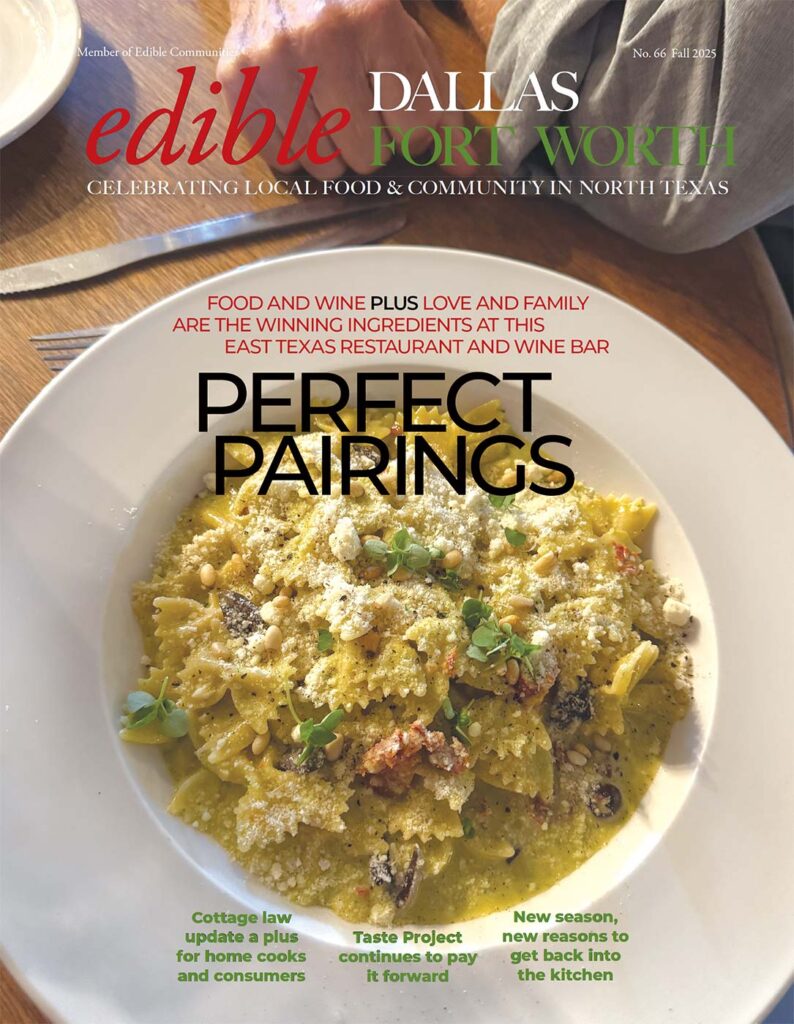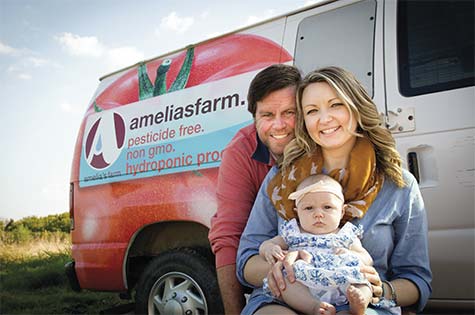
Ben, Amelia and Maddie Von Kennel
Photography by Marshall Hinsley
Three years ago, Ben and Amelia Von Kennel had rising careers in marketing and a nice home in Dallas’ Bishop Arts District. Neither was looking for a dramatic lifestyle change when a brief discussion with an Oak Lawn restaurateur led to their epiphany about tomatoes.
After enjoying a meal at Al Biernat’s eponymous steakhouse, Ben began telling Biernat about a friend’s new venture growing lettuce. Ben knew little about farming but he’d just spent several weekends helping his college buddy construct a commercial greenhouse near Waxahachie. As an unabashed marketer and good friend, Ben was hoping to convince the restaurateur to purchase his pal’s local lettuce.
His response, Ben recalls, was a short quip. “I can get plenty of lettuce,” said Biernat. “What I really need is a great tomato.” Thoughts raced through Ben’s mind. Knowing his friend’s facility was specific to lettuce, he began wondering what it would take to build a year-round greenhouse and grow a really great beefsteak tomato.
Never mind that neither he nor his wife had farming experience, unless you count potting houseplants or tending to an urban lawn. Never mind that Ben didn’t even particularly like the taste of tomatoes.
They gave their two weeks’ notice at work,
sold their house and moved to Bells, Texas—
a short drive south of the Red River and an
hour’s drive from just about anywhere else.
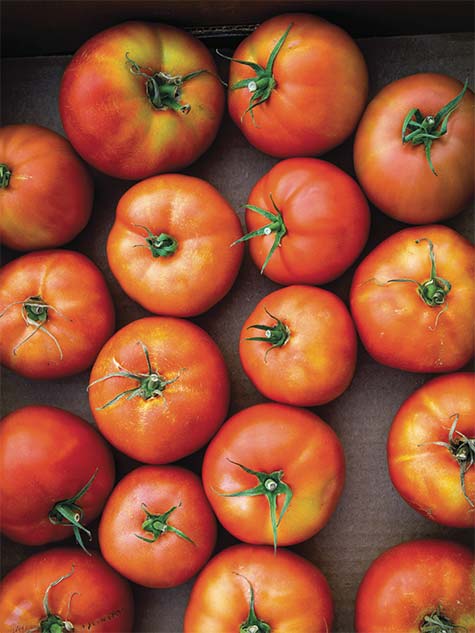
His weekends in the country had taught him that working with plants offered a serenity that a career in marketing just couldn’t provide. He contacted the greenhouse manufacturers and started pulling together facts and figures. The couple attended a farming class in Ohio and came back to Dallas with a decision to make. Ben’s family had some acreage near Sherman and his heart was set on this new endeavor. Amelia, however, wasn’t so convinced. She’d moved to Dallas from Wisconsin, excited about life in the big city.
“Growing tomatoes was something we had no background in,” said Amelia. “It was a whole new world. I just said, ‘You know, I believe in this dream you have. If it doesn’t work out, we can always go back and get our jobs in marketing.’”
So they gave their two weeks’ notice at work, sold their house and moved to Bells, Texas—a short drive south of the Red River and an hour’s drive from just about anywhere else.
Straightaway, Ben tapped into construction skills he didn’t know he had and erected their 6000 square foot greenhouse with a little help from friends. Amelia worked on their website, marketing materials and the farm’s logo. The name Amelia’s Farm just came to Ben, and he tossed it out to Amelia. Her name was uncommon, and it immediately conjured up a notion of a real people growing authentic food. The name stuck.
“I’d never had a good tomato,” Ben said of
his original dislike for the fruit’s taste.
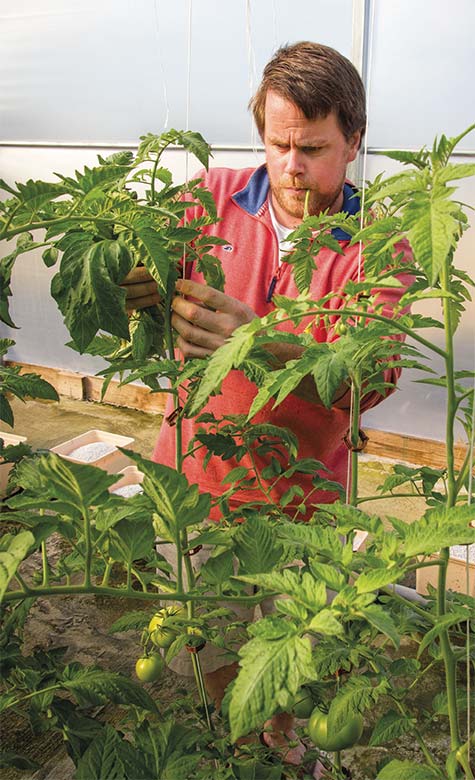
Through his friend, Ben had learned about hydroponics, a farming practice that allows growing without soil. This art of soilless farming has been the key to their success. Using only a fraction of the water tomatoes would need if grown in a field, hydroponic methods ensure fast growth and efficient use of resources.
Planted in Dutch buckets about the size of a bathroom sink, two tomato plants in each are fed by a nutrient-rich solution by way of a drip irrigation system timed to give the plants exactly what they need. This allows the tomatoes to grow compact roots, which redirects the plants’ energy toward creating huge vines and baseballto- softball-sized fruit. Two thousand buckets fit easily in the farm’s greenhouse.
No supplemental lighting is used, only sunshine. Insects are excluded by the greenhouse covering, but if an outbreak of mites flares up, ladybugs keep them under control. No pesticides are ever applied. The temperature stays at a comfortable range between the mid 70s and mid 80s, making it possible to harvest high-quality tomatoes every day of the year.
The greenhouse has an evaporative cooler on the south wall and huge exhaust fans on the north, a configuration that works with the prevailing southern winds of summer to pull air through the whole construction. In the winter, propane heaters keep out the cold.
“I’d never had a good tomato,” Ben said of his original dislike for the fruit’s taste.
The tomatoes found in big box grocery stores are mostly grown out of state, picked green and gassed along the way to ripen artificially in storage. These imposters have the appearance but not the taste or texture of a home-grown tomato.
What’s missing is the last stage of flavor infusion that can only happen when a tomato turns from green to red while still attached to the plant. This is when the fruit develops its unique combination of sweetness and acidity. Once red, ripe and loaded with flavor, a proper tomato should be eaten within days—some might say hours —after picking, a problem if it’s being shipped in from fifteen hundred miles away.
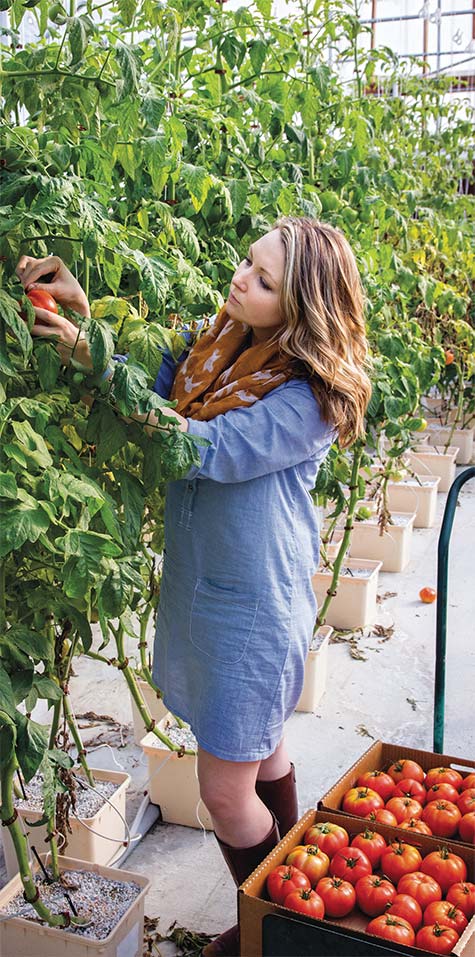
That’s the challenge faced by tomato-lovers, including North Texas chefs who want to include tomatoes on their menu outside of the local growing season. They’re often stuck with the choice of using substandard fruit or scratching anything tomato-related from the menu.
In September 2011, a few short months after getting underway, Ben and Amelia began to see the first fruits of their efforts.
“We woke up one morning and had red tomatoes,” said Ben. “It was panic time. We packed up as many as we could, drove down to the Dallas Farmers Market and sold our very first ones. We were excited because it was our first dollar. We had mainly been living off of savings.”
They then contacted prospective chefs who had shown an interest. First there was Al Biernat, living up to his word that he’d support a local source of good tomatoes. After that, sales came from Dallas’s Sundown at Granada and HG SPLY Co. Add to that Sissy’s, Lark on The Park, Meddlesome Moth and Fort Worth’s Bird Cafe, and you see how few restaurants it takes to go through tons of tomatoes. “This is the kind of tomato that reminds people of the ones their grandmother grew,” says Amelia.
“We didn’t have to sell hard,” said Ben, referring to his sales spiel to local chefs. “It was a simple, ‘Try some in your dishes, and feel free to give me a call.’ We let the quality speak for itself. It’s an honor because we were already fans of these restaurants we now sell to.”
The farm grows about 80 tons annually, most of which is sold to local restaurants. A waiting list has compelled them to build an additional 3,000 square feet of growing space, which will give them a total of 9,000 square feet by February.
Both Ben and Amelia worked in the hothouse initially.
Ben planted and pruned the plants and monitored the hydroponics system, making repairs as needed. Amelia harvested the tomatoes and packed them. Two days a week, Ben made his round of deliveries.
Their duties changed last summer with the birth of their daughter Madeline. Now Amelia handles the computer work and watches Maddie, while Ben manages the greenhouse and assigns tasks to their five part-time workers.
They’ve just celebrated their fourth anniversary together and believe this venture has hastened their growth, both personally and as a couple.
“I think it’s made our relationship so much stronger,” says Amelia. “It’s not the normal sort of relationship where you get up, go your separate ways and come back, have dinner and go to bed.”
There are always issues to tackle. When an ice storm damaged the greenhouse pipes, or when several rows of tomatoes fell off a guy-wire, they learned together how to solve the problem.
“These things are little hurdles,” Amelia continues. “How we get past them and move on has helped us individually and brought us together as a team.”
Adds Ben, “It’s been a hundred and eighty degree lifestyle change.”
MARSHALL HINSLEY is a writer and photographer who lives with his wife on a 40-acre farm south of Dallas. With a passion for growing sweet, vine-ripe specialty melons, he's also a sustainable farmer whose mission is to grow food crops in a way that improves the ecosystem and benefits wildlife as well.
- Marshall HInsleyhttps://www.edibledfw.com/author/mhinsley/
- Marshall HInsleyhttps://www.edibledfw.com/author/mhinsley/
- Marshall HInsleyhttps://www.edibledfw.com/author/mhinsley/
- Marshall HInsleyhttps://www.edibledfw.com/author/mhinsley/


